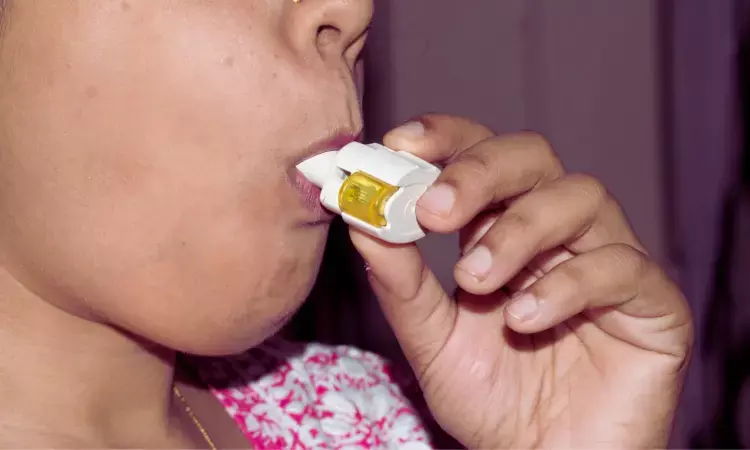- Home
- Medical news & Guidelines
- Anesthesiology
- Cardiology and CTVS
- Critical Care
- Dentistry
- Dermatology
- Diabetes and Endocrinology
- ENT
- Gastroenterology
- Medicine
- Nephrology
- Neurology
- Obstretics-Gynaecology
- Oncology
- Ophthalmology
- Orthopaedics
- Pediatrics-Neonatology
- Psychiatry
- Pulmonology
- Radiology
- Surgery
- Urology
- Laboratory Medicine
- Diet
- Nursing
- Paramedical
- Physiotherapy
- Health news
- Fact Check
- Bone Health Fact Check
- Brain Health Fact Check
- Cancer Related Fact Check
- Child Care Fact Check
- Dental and oral health fact check
- Diabetes and metabolic health fact check
- Diet and Nutrition Fact Check
- Eye and ENT Care Fact Check
- Fitness fact check
- Gut health fact check
- Heart health fact check
- Kidney health fact check
- Medical education fact check
- Men's health fact check
- Respiratory fact check
- Skin and hair care fact check
- Vaccine and Immunization fact check
- Women's health fact check
- AYUSH
- State News
- Andaman and Nicobar Islands
- Andhra Pradesh
- Arunachal Pradesh
- Assam
- Bihar
- Chandigarh
- Chattisgarh
- Dadra and Nagar Haveli
- Daman and Diu
- Delhi
- Goa
- Gujarat
- Haryana
- Himachal Pradesh
- Jammu & Kashmir
- Jharkhand
- Karnataka
- Kerala
- Ladakh
- Lakshadweep
- Madhya Pradesh
- Maharashtra
- Manipur
- Meghalaya
- Mizoram
- Nagaland
- Odisha
- Puducherry
- Punjab
- Rajasthan
- Sikkim
- Tamil Nadu
- Telangana
- Tripura
- Uttar Pradesh
- Uttrakhand
- West Bengal
- Medical Education
- Industry
Inhaled Insulin Regimen Promising as an Alternative to Pumps and Injections in Type 1 Diabetes: Study Shows

USA: A recent 13-week clinical evaluation has demonstrated that inhaled Technosphere Insulin (TI) combined with insulin degludec offers comparable or slightly improved glycemic control in adults with type 1 diabetes (T1D) compared to traditional insulin delivery methods.
The findings, published in Diabetes Technology & Therapeutics, suggest that TI could be an effective alternative for individuals seeking an option beyond multiple daily injections (MDI) or automated insulin delivery (AID) systems.
Roy W. Beck and colleagues from the JAEB Center for Health Research, Tampa, Florida, USA, highlight the rapid onset of action of inhaled Technosphere Insulin (TI, Afrezza) compared to rapid-acting insulin analogs (RAA). Their single-arm study aimed to evaluate whether transitioning from standard insulin delivery methods to a TI-degludec regimen would maintain noninferior daytime time-in-range (TIR) levels of 70–180 mg/dL. By assessing glycemic outcomes following the switch, the researchers sought to determine the effectiveness and potential advantages of TI-degludec in improving insulin therapy for adults with type 1 diabetes.
For this purpose, the researchers enrolled 49 adults with type 1 diabetes (who switched to a TI-degludec regimen for 13 weeks after completing 17 weeks in the usual-care control group of a randomized trial. The initial TI dose was set at approximately twice the RAA dose based on bioequivalence. The primary objective was to assess the noninferiority of daytime TIR 70–180 mg/dL at the end of 13 weeks.
The study led to the following findings:
- Among the 49 participants, 41% used automated insulin delivery (AID), 6% a predictive-low-glucose-suspend pump, 4% a sensor-augmented pump (SAP), and 49% multiple daily injections (MDI) plus continuous glucose monitoring during the 17-week baseline period.
- Daytime time-in-range (TIR) improved from 50% ± 17% at baseline to 55% ± 20% after 13 weeks, with a mean increase of 5.1%. The increase was 8.6% for MDI/SAP users, while there was no significant change for AID users.
- HbA1c decreased by an average of 0.23%, with a greater reduction of 0.36% among MDI/SAP users, while AID users saw no change.
- The proportion of participants meeting the HbA1c target of <7.0% increased from 14% to 31%.
- Overnight TIR decreased by 15.6% in baseline AID users but increased by 2.0% in baseline MDI/SAP users after switching to TI-degludec.
- The mean time spent in hypoglycemia (<54 mg/dL) was 0.5% ± 0.7% at baseline and 0.7% ± 0.8% after 13 weeks, with a mean change of 0.2%.
- After 13 weeks, 40% of participants expressed a willingness to continue using TI.
The study findings suggest that transitioning to the TI-degludec regimen in adults with T1D was safe and resulted in glycemic outcomes that were comparable or slightly improved compared to AID or MDI. The benefits were more pronounced in those switching from MDI or SAP, while AID users experienced a reduction in nighttime TIR but maintained overall glycemic control.
"These results support the efficacy and safety of a higher TI starting dose than the current U.S. labeling and highlight TI as a viable alternative for individuals seeking an option beyond insulin pumps or MDI for insulin delivery," the authors concluded.
Reference: https://doi.org/10.1089/dia.2024.0581
Dr Kamal Kant Kohli-MBBS, DTCD- a chest specialist with more than 30 years of practice and a flair for writing clinical articles, Dr Kamal Kant Kohli joined Medical Dialogues as a Chief Editor of Medical News. Besides writing articles, as an editor, he proofreads and verifies all the medical content published on Medical Dialogues including those coming from journals, studies,medical conferences,guidelines etc. Email: drkohli@medicaldialogues.in. Contact no. 011-43720751


